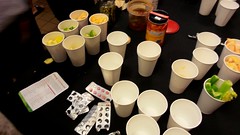 Over on Practical Ethics I blog about how to handle production of opiates from bioengineered yeast.
Over on Practical Ethics I blog about how to handle production of opiates from bioengineered yeast.
The basic problem is that opiates seem to be unusually harmful (rather nasty dependency, social withdrawal and risky methods of administration), yet restricting access looks hard in the long run. I don’t subscribe to the view that mere exposure will turn all people into addicts (it looks like it is a subset of people who are vulnerable), but there is a fair bit of harm here that likely is not outweighed by cheapness and better quality. Yet proposed methods restricting access to the modified yeast are unlikely to work in the long run, and may some bad effects on their own.
My own solution is to recognize that in 10-20 years it will be possible to brew many strong drugs discreetly at home, and that we need to reduce the harm from this by developing other technologies that make them less problematic. It might sound wussy and complex compared to the more easily actionable targets suggested in the article, but I think it has a greater chance of actually reducing harms in the long run than policies that merely delay the broad arrival of microbrew drugs.